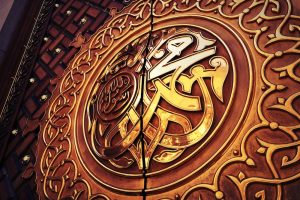
Amidst the darkness of the ongoing destruction of Gaza, it is heartwarming to see that many Jews, both liberal and orthodox, stand in solidarity with the people of Palestine and have made it clear that being Jewish is not the same thing as being a Zionist. Judaism, like all religions, stands for peace for the whole of humanity; Zionism is a nationalist ideology and like all other nationalist ideologies favours one nation at the expense of all others.
Not only do the religions of Islam and Judaism have a lot in common (e.g. belief in One God, avoidance of pork etc.) but even their holy languages are very similar. Arabic is the holy language of Muslims because that’s what the Holy Qur’an is written in, for Jews it’s Hebrew because it’s what the Torah (and the rest of the Tanakh) is written in. Both Arabic and Hebrew belong to the Semitic family of languages and are therefore very closely related. They have a lot of words in common that originate from a shared root with minor variations. Many of these shared words appear in both the Holy Qur’an and the Tanakh. Here’s just seven of them:
Peace
Salam (سَلام), Shalom (שָׁלוֹם)
سَلَٰمٌ عَلَىٰ مُوسَىٰ وَهَٰرُونَ
“Peace be on Moses and Aaron!” – (37:121)
יִשָּׂ֨א יְהוָֹ֤ה | פָּנָיו֙ אֵלֶ֔יךָ וְיָשֵׂ֥ם לְךָ֖ שָׁלֽוֹם
“May the Lord raise His countenance toward you and grant you peace.” – (Numbers 6:26)
It’s interesting to note that both Muslims and Jews have the same religious greeting based on the concept of peace; Muslims say “Assalamu alaikum” (ٱلسَّلَامُ عَلَيْكُمْ) and Jews say “Shalom aleichem” (שָׁלוֹם עֲלֵיכֶם). Both mean the same thing: “Peace be upon you”. This is a beautiful way to greet people and is certainly something that the world could use right now.
Life
Ḥayat (حَياة), Ḥayim (חַיִים)
لَہُمُ الۡبُشۡرٰی فِی الۡحَیٰوۃِ الدُّنۡیَا وَفِی الۡاٰخِرَۃِ
“For them are glad tidings in the present life and also in the Hereafter . . .” (10:65)
וַיִּפַּ֥ח בְּאַפָּ֖יו נִשְׁמַ֣ת חַיִּ֑ים וַיְהִ֥י הָֽאָדָ֖ם לְנֶ֥פֶשׁ חַיָּֽה
“. . . and He breathed into his nostrils the soul of life, and man became a living soul.” (Genesis 2:7)
Human life is the most precious thing there is. All religions teach discipline so that we use our lives well and do not squander them on pointless or trivial pursuits. All religions also teach peace so that we do not waste the lives of others by ending them prematurely. The sanctity of human life is fundamental to both Islam and Judaism as well as all other religions.
Blessing
Baraka (بَرَكة), Barakha (בְּרָכָה)
قِیۡلَ یٰنُوۡحُ اہۡبِطۡ بِسَلٰمٍ مِّنَّا وَبَرَکٰتٍ عَلَیۡکَ
“It was said, ‘O Noah, descend then with peace from Us and blessings upon thee . . .” (11:49)
וְזֹ֣את הַבְּרָכָ֗ה אֲשֶׁ֨ר בֵּרַ֥ךְ משֶׁ֛ה אִ֥ישׁ הָֽאֱלֹהִ֖ים אֶת־בְּנֵ֣י יִשְׂרָאֵ֑ל לִפְנֵ֖י מוֹתֽוֹ
“And this is the blessing with which Moses, the man of God, blessed the children of Israel [just] before his death.” (Deuteronomy 33:1)
Generally speaking, a blessing is favour or gift bestowed upon us by God. In both Islam and Judaism, the purpose of following religious commandments is to attract God’s blessings. By reforming our conduct and behaviour in accordance with the will of God, we can also become a source of blessings for other people, rather than being a source of misery or pain.
One
Aḥad (اَحَد), Eḥad (אֶחָד)
قُلۡ اِنَّمَاۤ اَدۡعُوۡا رَبِّیۡ وَلَاۤ اُشۡرِکُ بِہٖۤ اَحَدًا
“Say, ‘I pray to my Lord only, and I associate no one with Him.’” (72:21)
שְׁמַ֖ע יִשְׂרָאֵ֑ל יְהֹוָ֥ה אֱלֹהֵ֖ינוּ יְהֹוָ֥ה | אֶחָֽד
“Hear, O Israel: The Lord is our God; the Lord is one.” (Deuteronomy 6:4)
Both Muslims and Jews believe in the concept of One God who is the creator of the universe and of humanity. All human beings are His creation and we are all the children of One God. Therefore, it only makes sense that we should all live together in a spirit of unity and brotherhood. It is on account of this belief that all true Muslims and Jews stand with those who are unjustly victimised or persecuted.
Brother
Akh (أخ), Akh (אָח)
یَوۡمَ یَفِرُّ الۡمَرۡءُ مِنۡ اَخِیۡہِ
“On the day when a man flees from his brother,” (80:35)
לֹֽא־תִשְׂנָ֥א אֶת־אָחִ֖יךָ בִּלְבָבֶ֑ךָ
“You shall not hate your brother in your heart.” (Leviticus 19:17)
Both Muslims and Jews believe in Abraham (as) and in his sons Ishmael (as) and Isaac (as). Interestingly, Jews claim descent from Isaac (as) whereas Arabs (and therefore the first Muslims) claim descent from Ishmael (as), meaning that Jews and Arab Muslims are effectively brothers. At any rate, all human beings should live together in a spirit of brotherhood irrespective of nationality or ethnic lineage.
Faith
Iman (إيمان), Emuna (אֱמוּנָה)
فَاَمَّا الَّذِیۡنَ اٰمَنُوۡا فَزَادَتۡہُمۡ اِیۡمَانًا وَّہُمۡ یَسۡتَبۡشِرُوۡنَ
“. . . But, as to those who believe, it increases their faith and they rejoice.” (9:124)
וְצַדִּ֖יק בֶּֽאֱמוּנָת֥וֹ יִחְיֶֽה
“. . . the righteous shall live by his faith.” (Habakkuk 2:4)
Faith is about having trust or confidence in someone. In a religious context, it is about having trust or confidence in God even when it may seem difficult. For instance, it can be especially difficult to follow God’s commandments to treat others with justice when you have been wronged and have a strong desire for vengeance. But it’s times like these that faith in God truly shines.
Mercy
Raḥma (رَحْمة), Raḥmim (רַחֲמִים)
رَبَّنَا لَا تُزِغۡ قُلُوۡبَنَا بَعۡدَ اِذۡ ہَدَیۡتَنَا وَہَبۡ لَنَا مِنۡ لَّدُنۡکَ رَحۡمَۃً ۚ اِنَّکَ اَنۡتَ الۡوَہَّابُ
“Our Lord, let not our hearts become perverse after Thou hast guided us; and bestow on us mercy from Thyself; surely, Thou alone art the Bestower.” (3:9)
הַגּוֹאֵ֣ל מִשַּׁ֣חַת חַיָּ֑יְכִי הַֽ֜מְעַטְּרֵ֗כִי חֶ֣סֶד וְרַֽחֲמִֽים
“Who redeems your life from the pit, Who crowns you with kindness and mercy.” (Psalms 103:4)
In both Islam and Judaism, God is described as being Merciful. Ideally, we would all like to be the recipients of God’s mercy and avoid His wrath. But in order to deserve God’s mercy, we should be merciful to others as well. Even if we have been wronged and are in a position of power to act other than with decency.
About the Author: Mansoor Dahri is an online editor for The Review of Religions. He graduated from UCL in BA Ancient Languages.




Add Comment